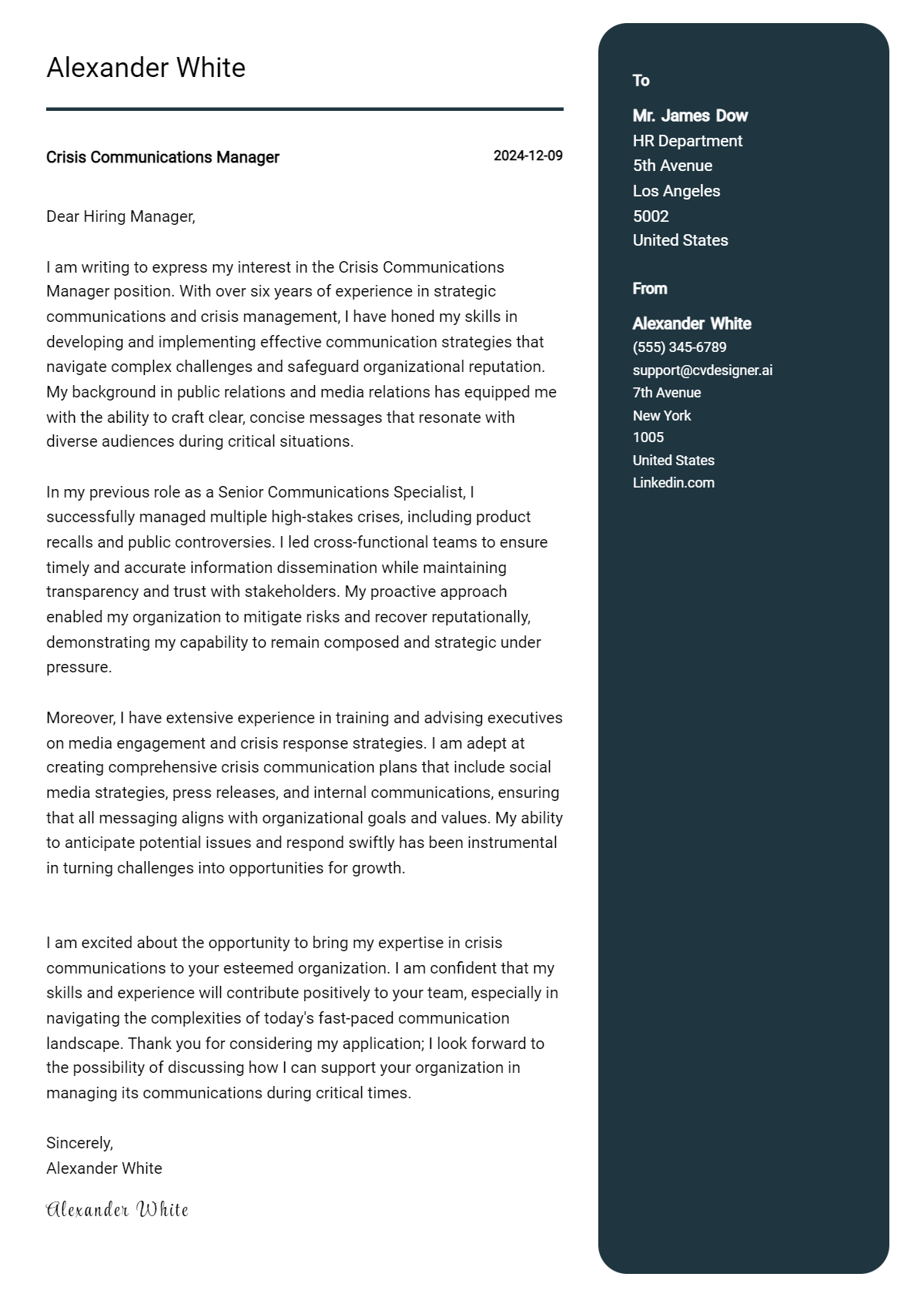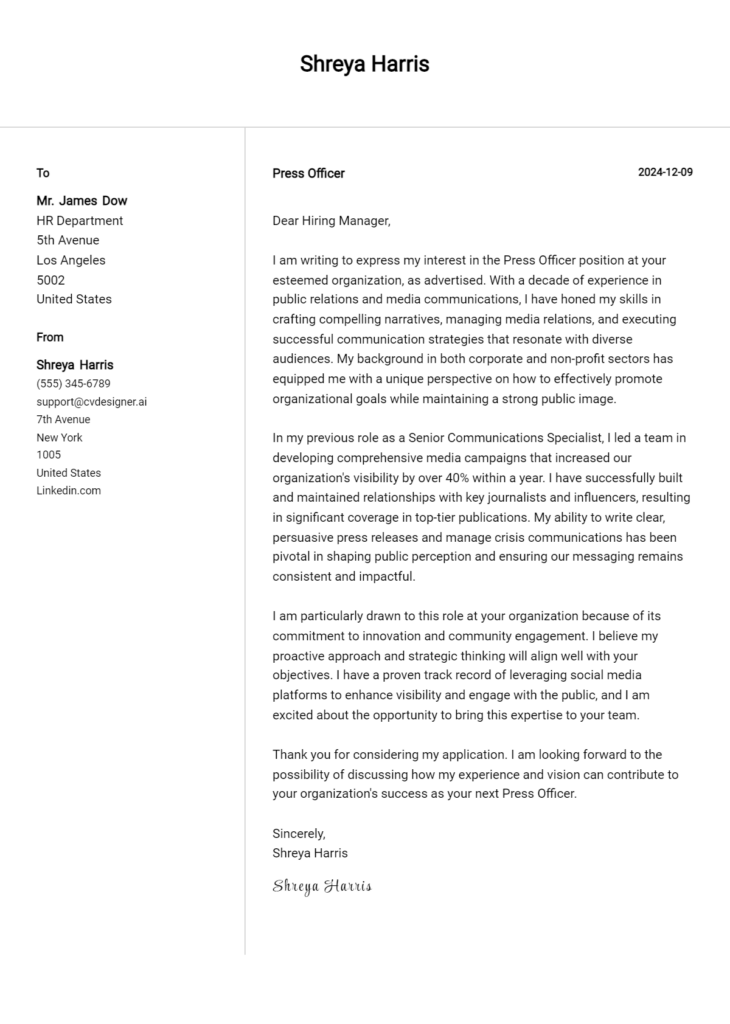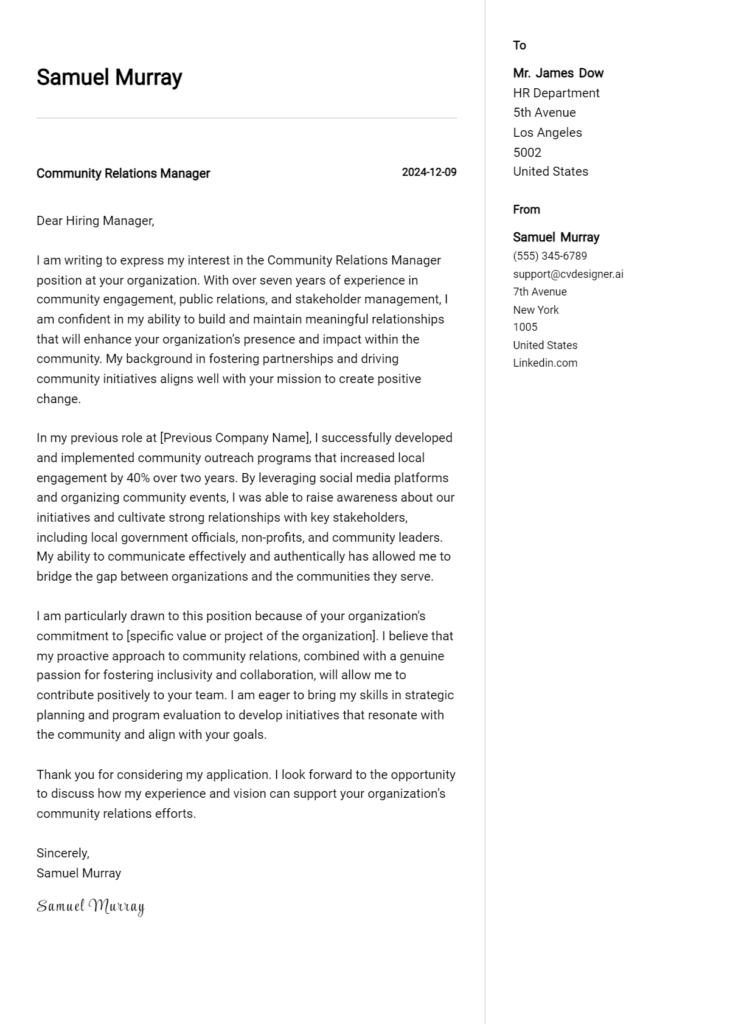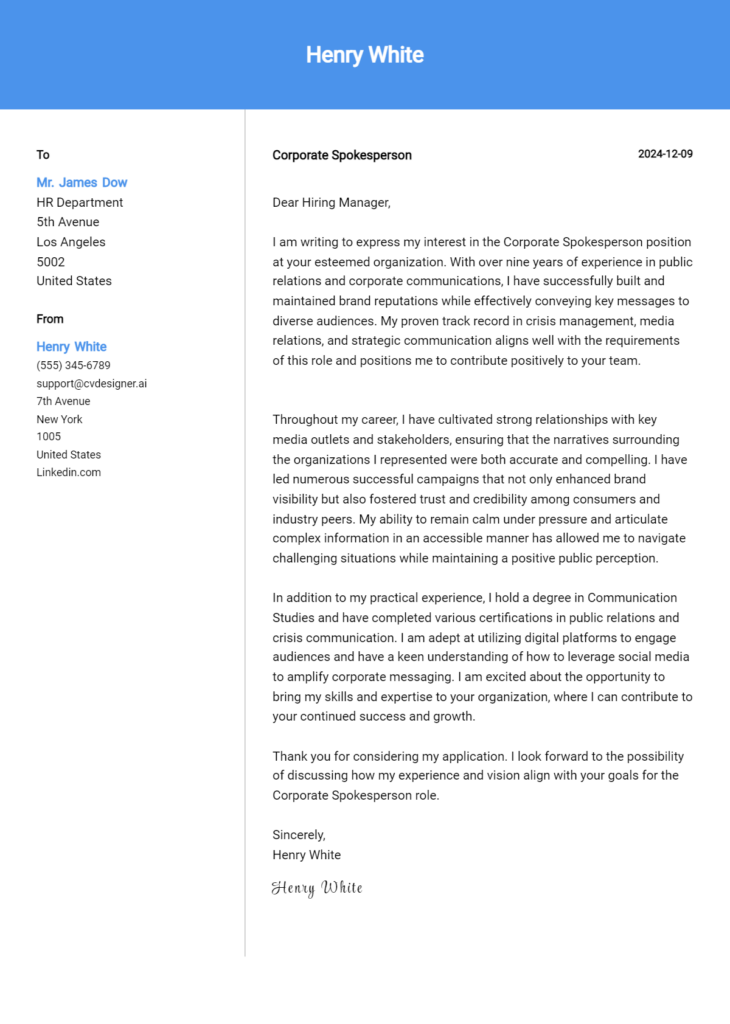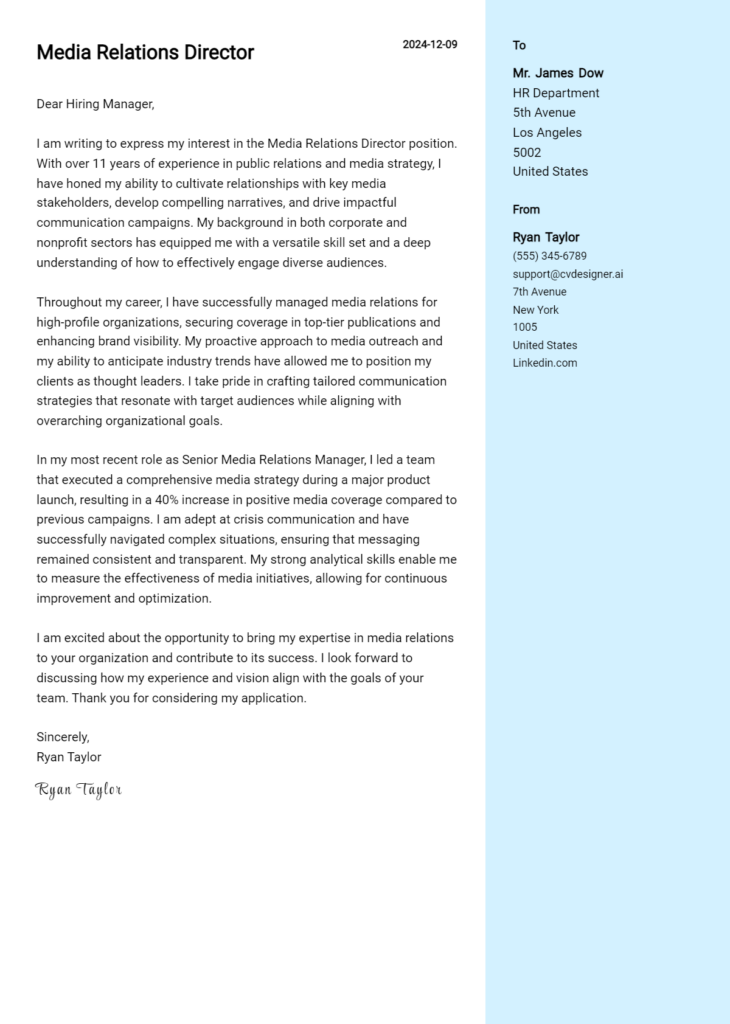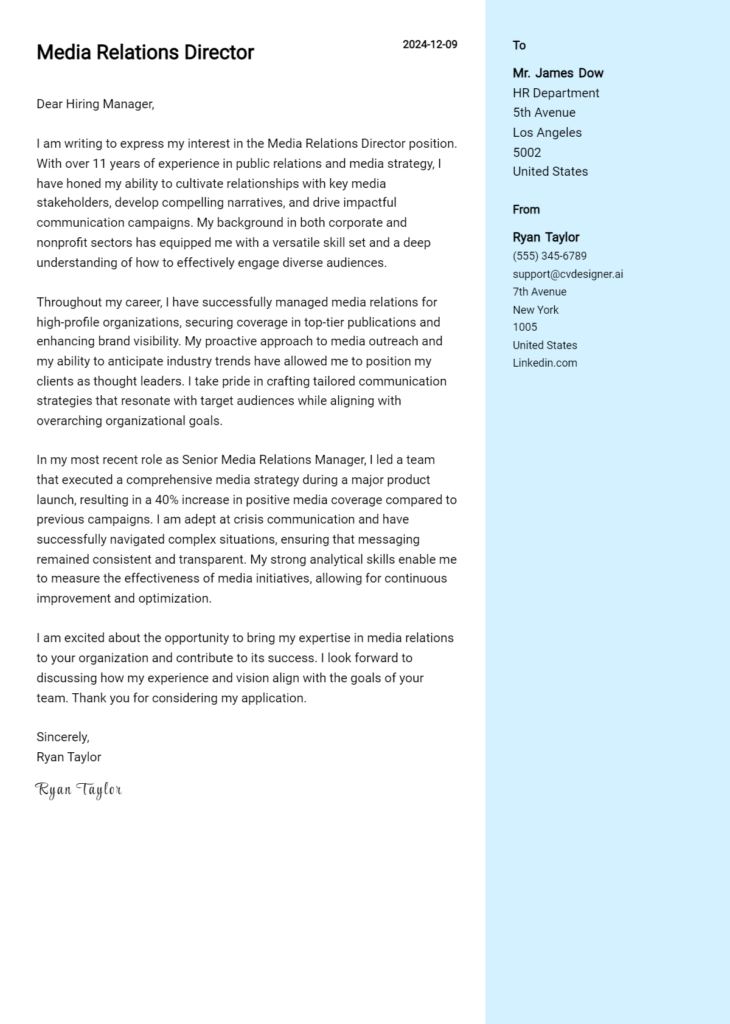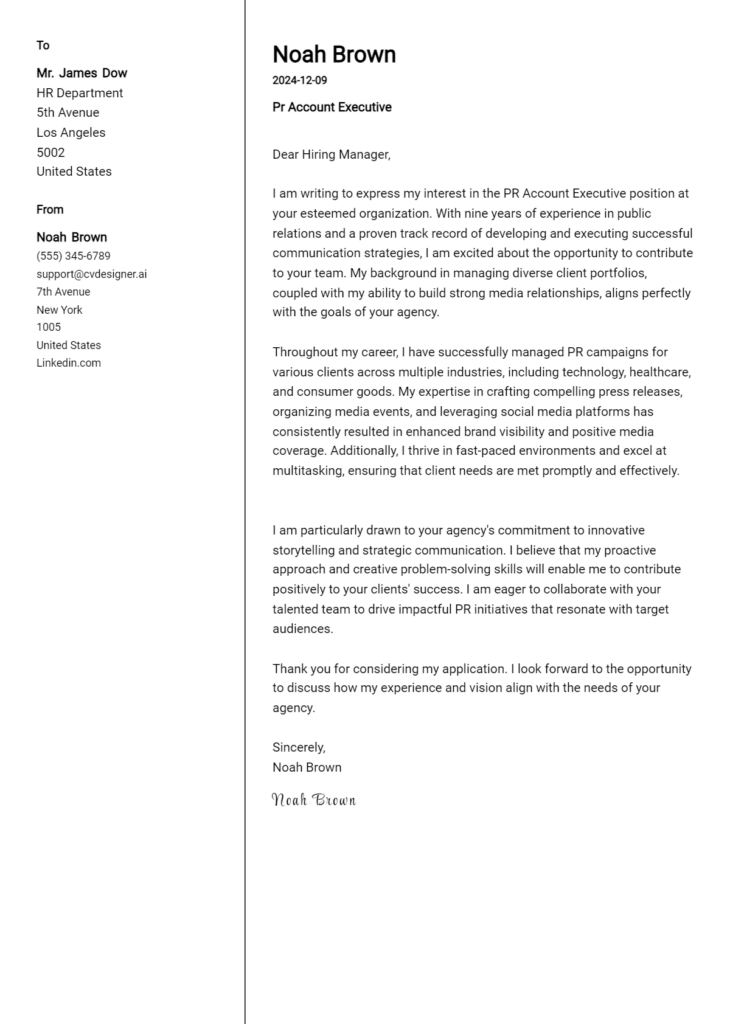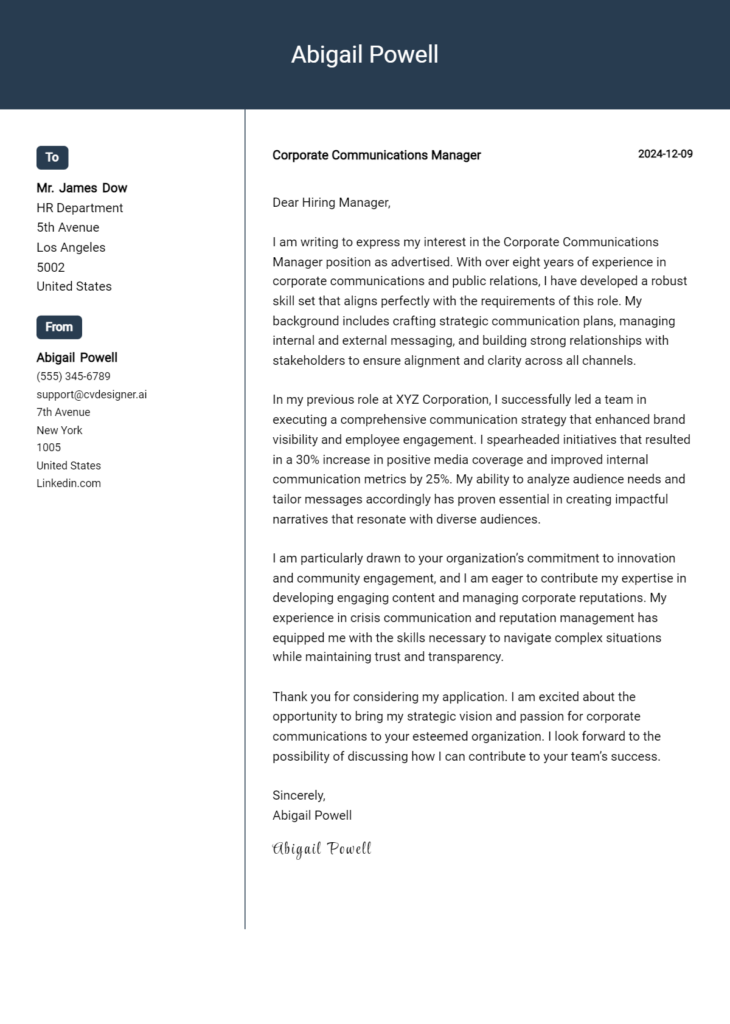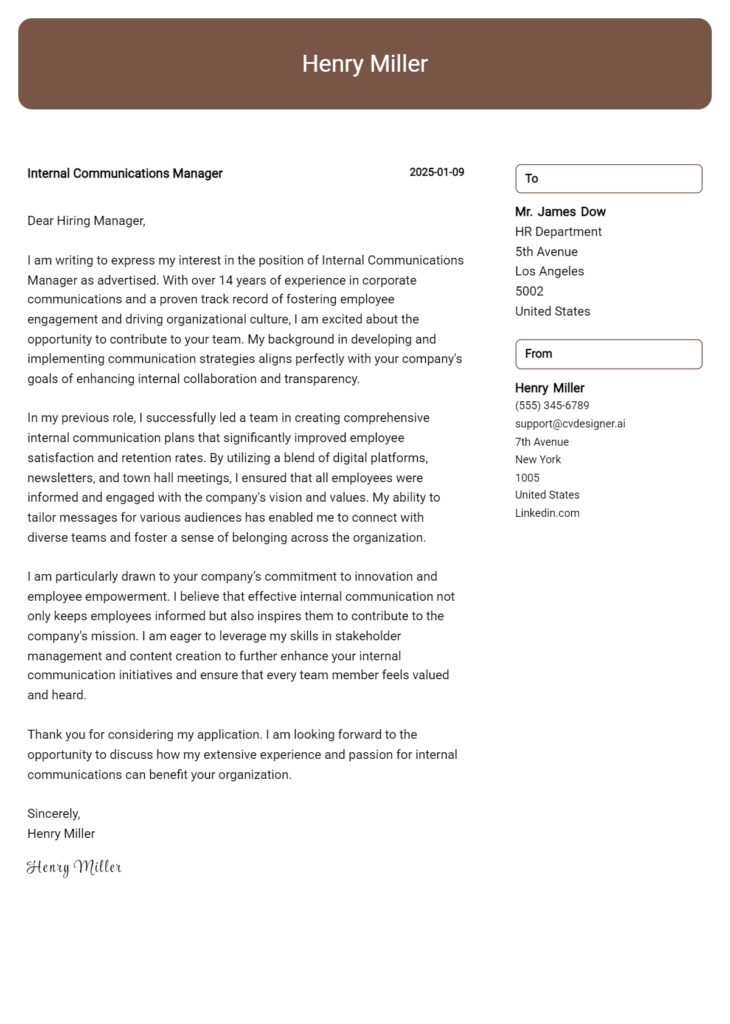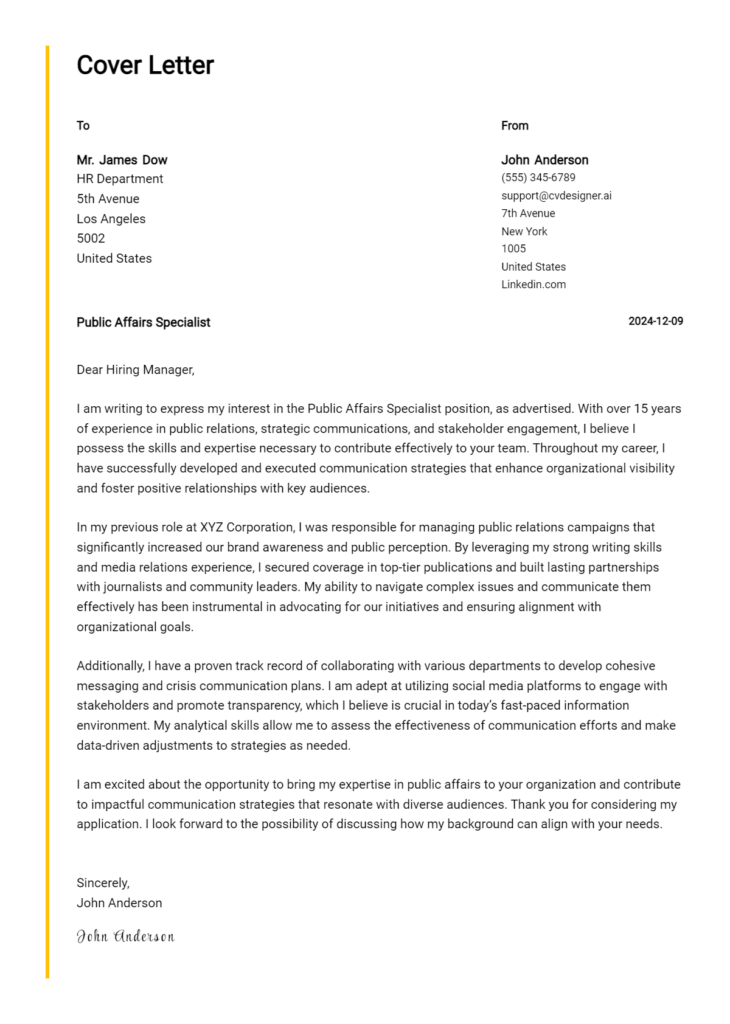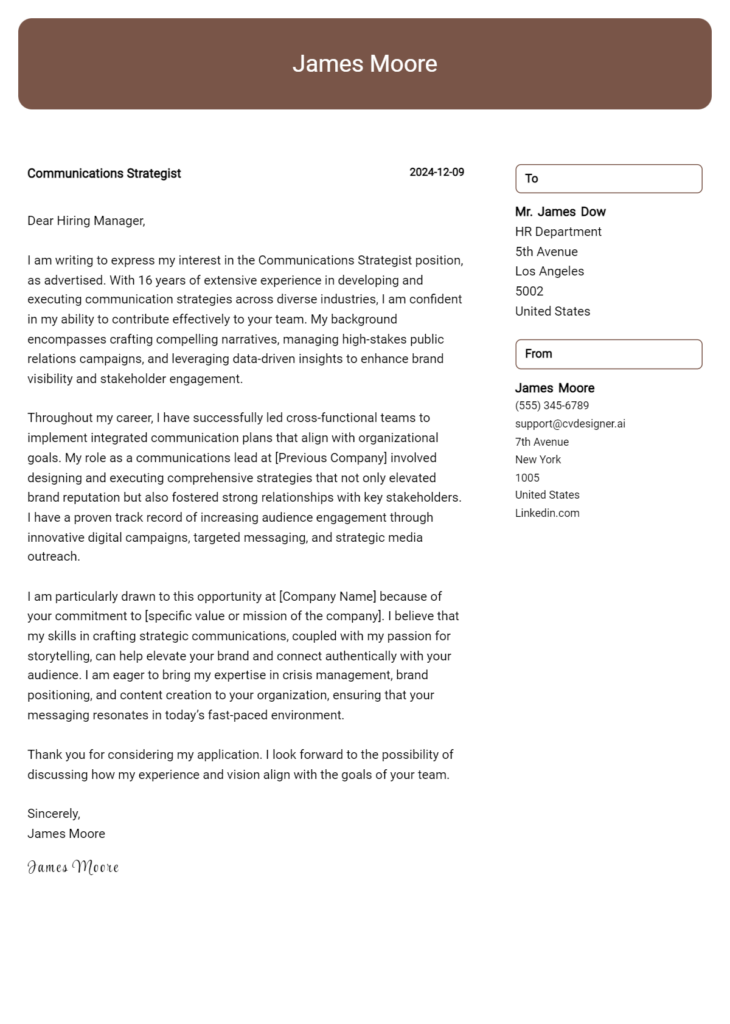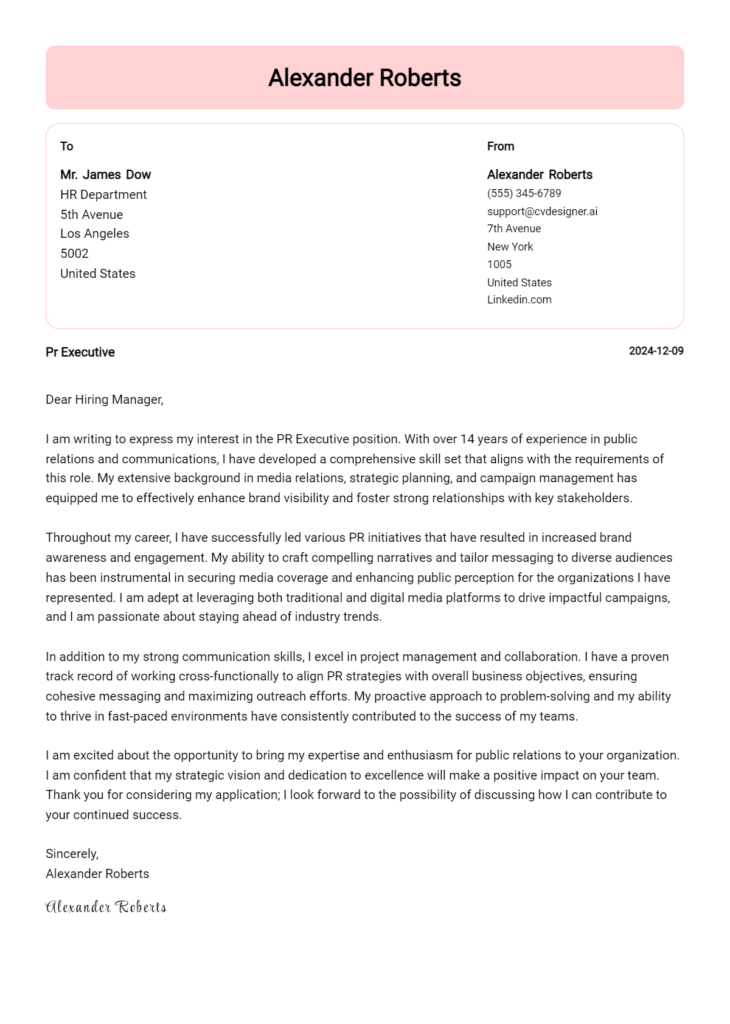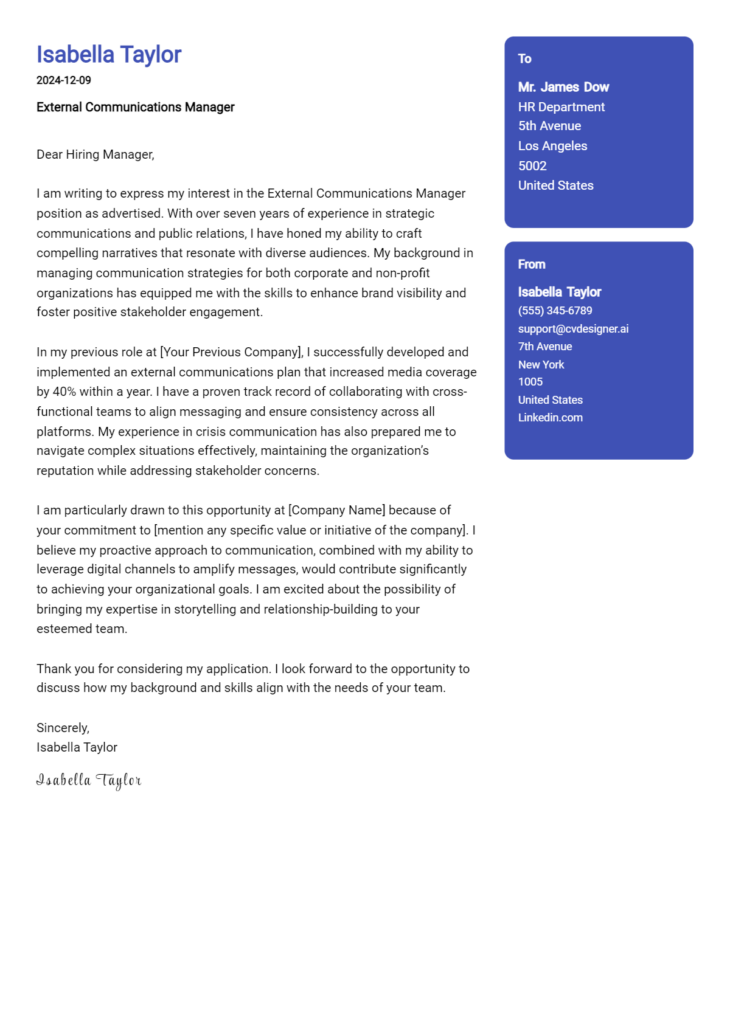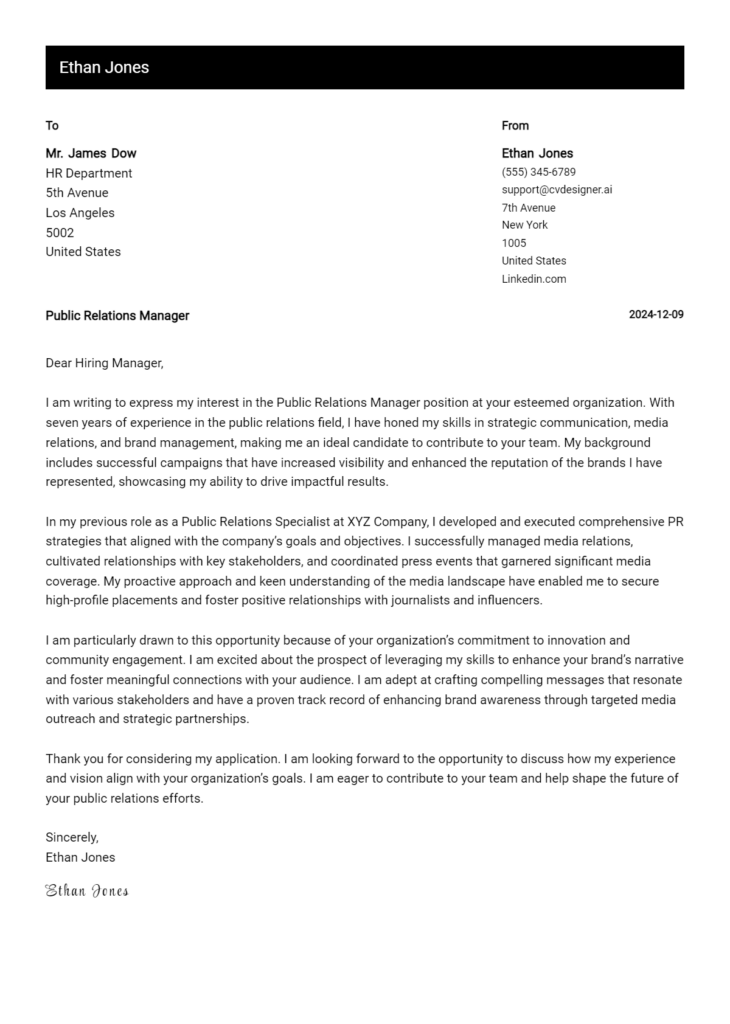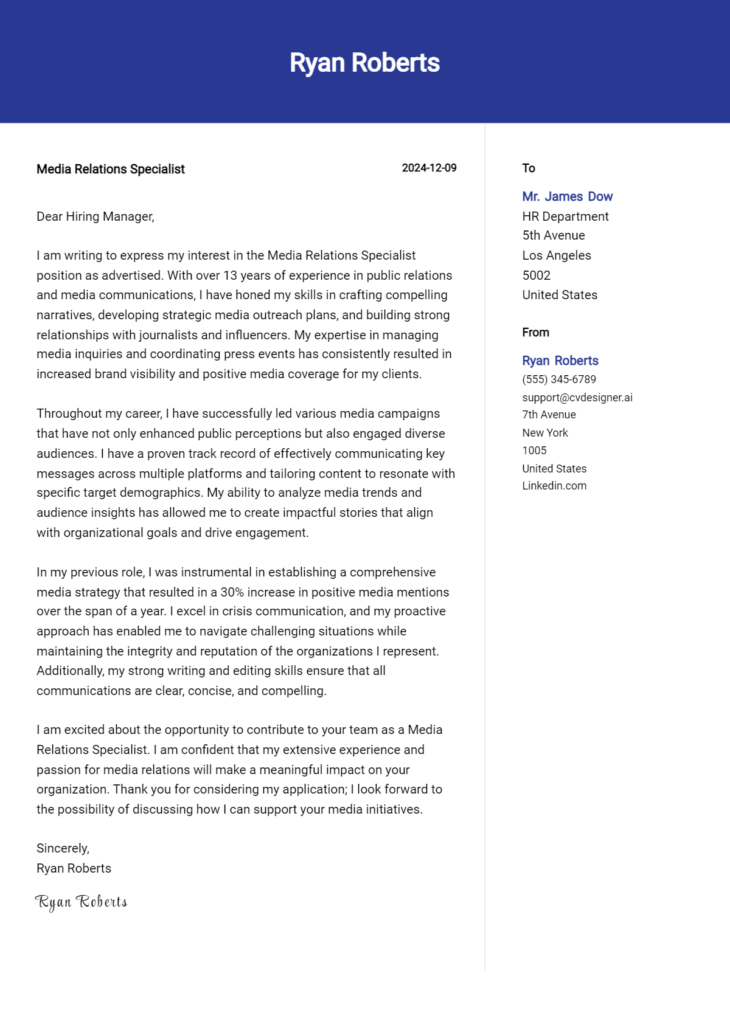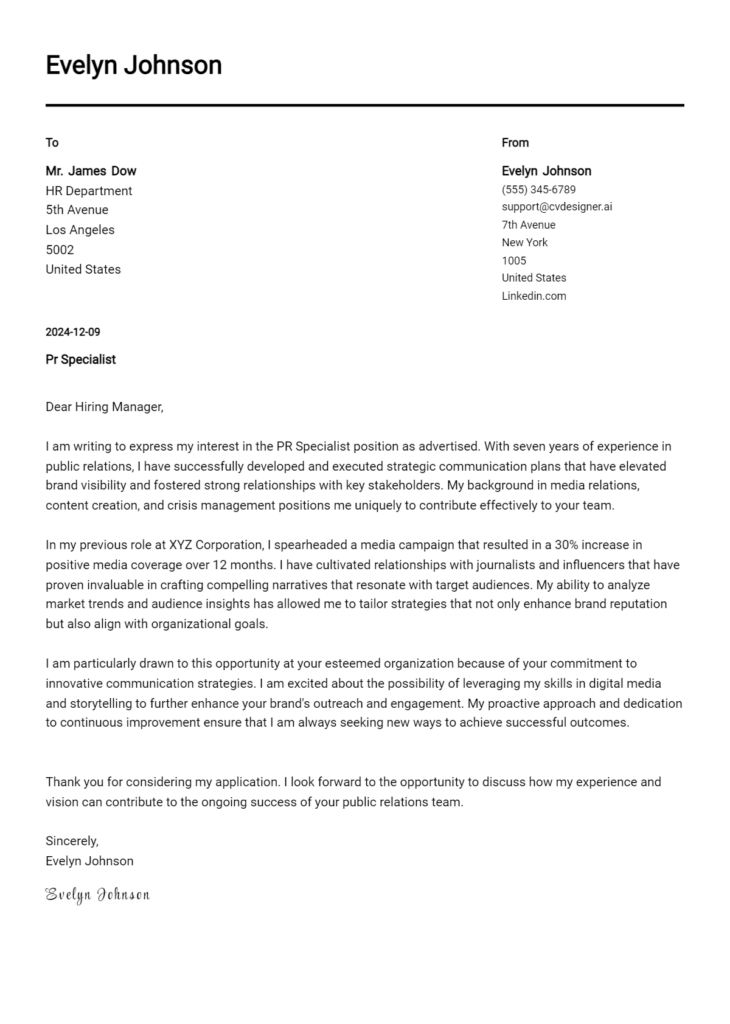Crisis Communications Manager Cover Letter Examples
Explore additional Crisis Communications Manager cover letter samples and guides and see what works for your level of experience or role.
How to Format a Crisis Communications Manager Cover Letter
Crafting an effective cover letter is essential for a Crisis Communications Manager, as it serves as your first opportunity to make a strong impression on potential employers. In this high-stakes role, your ability to communicate clearly and persuasively is paramount; thus, how you structure your cover letter can greatly influence the hiring manager's perception of your capabilities. A well-formatted cover letter not only showcases your qualifications but also reflects your strategic thinking and attention to detail—qualities that are crucial in managing crises effectively.
In this guide, we'll outline the key components of a professional cover letter tailored for a Crisis Communications Manager position, including:
- Cover Letter Header
- Cover Letter Greeting
- Cover Letter Introduction
- Cover Letter Body
- Cover Letter Closing
Each section is vital for demonstrating your expertise and professionalism. Let’s delve into each part and discover how to create a standout cover letter that aligns with the demands of this critical role.
The Importance of a Cover Letter Header for a Crisis Communications Manager
A well-structured cover letter header is crucial for a Crisis Communications Manager, as it sets the tone for the entire communication and reflects the candidate's professionalism and attention to detail. The header should include essential contact information, the date, and the recipient's details to ensure clarity and facilitate easy communication. A clear and professional header not only conveys credibility but also demonstrates the candidate's understanding of effective communication practices, which is vital in crisis management. Below are examples of a strong and weak cover letter header for this role:
Strong Example
Jane Doe 1234 Elm Street City, State, Zip jane.doe@email.com (123) 456-7890 [Date] John Smith Hiring Manager XYZ Corporation 5678 Oak Avenue City, State, Zip
Weak Example
Jane D. jane@email.com 12/01/2023 Hey there,
The Importance of the Cover Letter Greeting
The greeting of your cover letter is crucial in setting the tone for the rest of your application. It serves as the first impression you make on the hiring manager and can influence how they perceive your professionalism and attention to detail. By addressing the hiring manager directly, you not only personalize your letter but also demonstrate your genuine interest in the role. To avoid sounding generic, take the time to research the recipient's name and title. A tailored greeting can make your cover letter stand out, while a generic one can suggest a lack of effort or commitment.
When crafting your greeting, consider using the hiring manager's full name when possible. If you're unsure of the name, a more general title can suffice, but be cautious to avoid overly generic phrases like "To Whom It May Concern." Below are some examples of strong and weak greetings for a Crisis Communications Manager cover letter.
Strong Greeting Example
Dear Ms. Johnson,
Weak Greeting Example
To Whom It May Concern,
The Importance of a Well-Crafted Cover Letter Introduction for a Crisis Communications Manager
In the competitive field of crisis communications, the cover letter introduction serves as a critical gateway for candidates looking to make a lasting impression. A strong introduction not only captures the hiring manager's attention but also expresses genuine interest in the role while briefly showcasing key skills or achievements that align with the position. This initial paragraph sets the tone for the rest of the cover letter and can significantly influence the hiring manager's perception of the candidate. Below are examples of strong and weak cover letter introductions for a Crisis Communications Manager role.
Strong Example
Dear [Hiring Manager's Name], As a seasoned communications professional with over eight years of experience in managing high-stakes crisis situations, I am excited to apply for the Crisis Communications Manager position at [Company Name]. My proven track record in developing effective communication strategies during critical events, coupled with my ability to remain calm under pressure, makes me a perfect fit for your team. I have successfully navigated crises that required swift decision-making and clear messaging, resulting in positive outcomes and strengthened stakeholder trust.
Weak Example
To Whom It May Concern, I am writing to express my interest in the Crisis Communications Manager job. I think I am qualified because I have done some communication work before. I have handled a few issues, and I believe I could do well in this role.
Purpose of the Cover Letter Body for a Crisis Communications Manager
The body of a cover letter for a Crisis Communications Manager serves as a crucial component in showcasing the candidate's relevant skills, experiences, and the unique value they can bring to the organization. It allows the applicant to highlight specific projects or accomplishments that illustrate their ability to effectively manage communication during crises, craft strategic messaging, and maintain the company's reputation. By providing concrete examples of past successes—such as successfully navigated crises or implemented communication strategies—the candidate can demonstrate their expertise and readiness to handle high-pressure situations.
Strong Example
Dear Hiring Manager, I am excited to apply for the Crisis Communications Manager position at XYZ Corporation. In my previous role at ABC Company, I led a team that successfully managed a significant data breach, developing a comprehensive communication strategy that included timely press releases, direct stakeholder communication, and social media updates. As a result, we were able to restore public trust within 48 hours, a feat acknowledged by industry peers. Additionally, I spearheaded a training program for executives on crisis response, enhancing our readiness for potential future incidents. I am eager to bring my expertise in crisis management and strategic communication to XYZ Corporation, ensuring we navigate any challenges while safeguarding our reputation.
Weak Example
Dear Hiring Manager, I am writing to express my interest in the Crisis Communications Manager position. I have some experience in communications and have dealt with a few small issues in the past. I think I could be a good fit for the role. I helped my last company with some press releases and handled some emails during a minor crisis. I believe I can learn quickly and contribute to your team.
The Importance of the Cover Letter Closing for a Crisis Communications Manager
The closing paragraph of a cover letter is crucial for a Crisis Communications Manager as it serves as the final opportunity to leave a positive impression on the hiring manager. It should effectively summarize your qualifications, reiterate your enthusiasm for the role, and encourage the reader to take the next steps, such as reviewing your resume or scheduling an interview. A strong closing conveys confidence and eagerness, while a weak closing may lack clarity and fail to motivate further action.
Strong Example
Thank you for considering my application for the Crisis Communications Manager position. With my extensive experience in managing high-stakes communications and my commitment to proactive reputation management, I am excited about the opportunity to contribute to your team. I look forward to the possibility of discussing how my skills align with your needs and would be grateful for the chance to further elaborate on my qualifications in an interview. Please feel free to contact me at your earliest convenience to arrange a meeting.
Weak Example
I hope you look at my resume. I think I would be good for this job. Let me know what you think. Thanks.
Crafting an effective cover letter for a Crisis Communications Manager position is crucial in demonstrating your qualifications and suitability for this high-stakes role. This document should not only highlight your technical skills and problem-solving abilities but also showcase your understanding of the Software Development Life Cycle (SDLC), your capacity for teamwork, and your commitment to continuous learning. By following these tips, you can create a compelling cover letter that stands out to potential employers.
Tips for Writing Your Cover Letter
Highlight Technical Skills:
Clearly outline your technical skills relevant to crisis communications, such as proficiency in media monitoring tools, social media management, and data analysis software. Mention specific tools you are familiar with and how they have helped you effectively manage communications during past crises.Showcase Problem-Solving Abilities:
Provide examples of how you have successfully navigated challenging situations in previous roles. Discuss a specific crisis you managed, the strategies you employed, and the outcome. This demonstrates your ability to think critically and act decisively under pressure.Demonstrate SDLC Knowledge:
If applicable, illustrate your understanding of the Software Development Life Cycle in relation to crisis management. Explain how your knowledge of SDLC can enhance your communication strategies and ensure that all stakeholders are informed and engaged throughout a crisis event.Emphasize Teamwork:
Crisis communications often require collaboration across various departments. Share experiences where you worked effectively within a team to develop and execute a crisis response plan. Highlight your communication skills and your ability to foster a cooperative atmosphere, even in high-pressure situations.Express a Passion for Continuous Learning:
Convey your enthusiasm for staying updated on the latest trends and best practices in crisis communications. Mention any relevant certifications, workshops, or courses you have undertaken or plan to pursue. This shows potential employers that you are proactive about professional development and committed to improving your skills.
For further assistance, consider utilizing cover letter templates or a cover letter builder to streamline your writing process and create a polished final product.
Common Mistakes to Avoid in a Crisis Communications Manager Cover Letter
Crafting an effective cover letter is crucial for standing out as a Crisis Communications Manager, as it serves as your first impression to potential employers. Avoiding common mistakes can significantly enhance your chances of landing an interview. Here are some pitfalls to steer clear of:
Generic Greetings: Failing to address the letter to a specific individual can make your application seem impersonal. Always try to find the hiring manager's name for a tailored greeting.
Lack of Specificity: Many candidates make the mistake of using vague language. Instead, be specific about your experiences and how they relate to crisis management. Use concrete examples to illustrate your skills.
Ignoring the Job Description: Not aligning your cover letter with the job description can lead to missed opportunities. Highlight relevant experiences that directly correspond to the responsibilities listed in the posting.
Overly Lengthy Content: Lengthy cover letters can lose the reader's interest. Aim for a concise format with a clear structure, focusing on the most relevant points. For guidance on how to format your letter, refer to this cover letter format.
Neglecting Proofreading: Spelling and grammatical errors can undermine your professionalism. Always proofread your letter or have someone else review it to catch any mistakes before submission.
Failure to Showcase Soft Skills: While technical skills are important, crisis communications also require strong interpersonal skills. Make sure to mention your ability to remain calm under pressure and communicate clearly.
Not Including a Call to Action: Ending your cover letter without a strong closing can leave a weak impression. Express your eagerness to discuss your application further and thank them for their consideration.
By avoiding these common mistakes, you can create a compelling cover letter that resonates with employers and showcases your qualifications for the role. For inspiration, check out these cover letter examples.
Cover Letter FAQs for Crisis Communications Manager
What should I include in my cover letter as a Crisis Communications Manager?
In your cover letter, focus on your experience in managing communications during crises, demonstrating your ability to think critically under pressure. Highlight specific examples of crises you have managed, the strategies you implemented, and the outcomes achieved. Emphasize your skills in media relations, message crafting, and stakeholder engagement. Additionally, mention any relevant certifications or training, such as PR crisis management or strategic communication courses, to bolster your qualifications. Tailor your letter to the specific organization, showing your understanding of their values and how your expertise can contribute to their crisis communication needs.
How can I demonstrate my communication skills in the cover letter?
To showcase your communication skills, use clear and concise language throughout your cover letter. Avoid jargon and overly complex sentences, opting instead for straightforward explanations of your experiences and achievements. You can provide specific instances where your communication skills made a significant impact, such as effectively managing media inquiries or developing crisis messaging that mitigated negative publicity. Consider using bullet points for key accomplishments that illustrate your ability to convey complex information simply. Lastly, make sure to proofread for grammatical accuracy, as attention to detail is crucial in crisis communications.
Should I address my cover letter to a specific person?
Whenever possible, you should address your cover letter to a specific individual, such as the hiring manager or head of communications. This demonstrates your initiative and interest in the position. If the job listing doesn’t include a name, you can research the company’s website or LinkedIn to find the appropriate person to address. If you can't find a name, a general salutation like "Dear Hiring Committee" is acceptable. Personalizing your cover letter helps make a connection and shows that you’ve taken the time to learn about the organization.
How long should my cover letter be for a Crisis Communications Manager position?
Your cover letter should ideally be one page in length, typically three to four paragraphs. This length allows you to convey your qualifications effectively without overwhelming the reader. Focus on being succinct; each paragraph should serve a specific purpose—introducing yourself, highlighting relevant experiences, expressing your interest in the role, and concluding with a call to action. Aim for clarity and impact, ensuring that every word adds value to your message. Hiring managers appreciate brevity, especially in high-stakes fields like crisis communications, where clear and effective messaging is paramount.
Build your Cover Letter in minutes
Use an AI-powered cover letter builder and have your letter done in 5 minutes. Just select your template and our software will guide you through the process.

